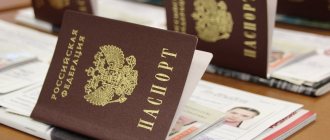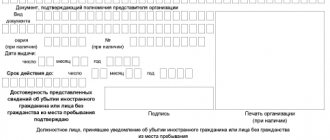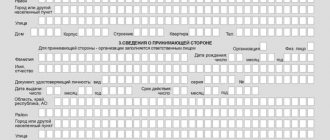Registration rules for a foreigner
There is a limited time available for registration of foreigners. For those arriving from other countries and planning to reside in the Russian Federation for some time or on a permanent basis, a period of 7 calendar days is provided for the purpose of registration. It is carried out at the place of actual residence or temporary stay. For violation of the current registration rules, the legislation of the Russian Federation provides for administrative liability. A fine for failure to register a foreign citizen is the most common punishment.
To register, you must contact the appropriate department of the territorial Department of Internal Affairs of the Ministry of Internal Affairs of the locality in which the foreigner is expected to reside. The registration procedure is carried out by the receiving party. In this capacity has the right to act:
- a citizen of the Russian Federation registering a foreigner in a residential premises belonging to him;
- a legal entity hiring a foreigner;
- a legal entity that has accepted a foreigner for a period of temporary stay. These are the owners (or representatives of the owners) of hotel complexes, medical institutions, etc.;
- a foreigner who is the owner of housing in the Russian Federation and resides permanently in Russia.
To register, fill out a form for registration of a foreign citizen. Documents submitted along with the application form are a migration card and a foreigner’s passport. Depending on who exactly acts as the host, a housing lease agreement or other necessary documents may be required in addition to those already listed.
Download the application form (.PDF)
Whom to pay
A fine for overdue registration at the place of residence or stay is issued to certain persons. Who exactly? Who will pay for failure to fulfill migration registration obligations?
Typically, sanctions are imposed on two parties at once - on the owner of the property and on the violating tenant. They will have to pay the bills in full. There are no benefits provided here.
If we are talking about registration actions with a car, the owner of the vehicle will have to bear responsibility. There is nothing difficult or incomprehensible about this. The main thing is to know how much and when to pay.
Duration of stay according to law
If a foreigner is a citizen of a country with which Russia has a visa regime, then the period of his stay on the territory of our country is determined by the validity period of his visa. For citizens of states with a visa-free regime with the Russian Federation, they (stay periods) are 90 days out of every 180 days. Accordingly, in both cases, when registering a foreigner, we must talk about temporary registration. An exception to this rule is permanent “registration” in residential premises, to the use of which a foreign citizen has a confirmed right.
Overdue registration is grounds for bringing a foreigner to administrative liability. There are various ways to check the authenticity of a temporary registration. Thus, a foreign citizen can be interviewed by representatives of the relevant services in person, and his data can be checked at the Main Directorate for Migration of the Ministry of Internal Affairs of the Russian Federation. If necessary, the authorities resort to surveys of owners of housing in which a foreigner is registered, to checking the foreigner’s rental document, etc.
Machines and officials
At this stage, the various penalties do not end. We have studied the fine for overdue registration at the place of residence, as well as for late vehicle registration for individuals and companies. There are several other important points in the chosen area.
If the official did not register the car on time, he will also need to pay for the violation. Practice shows that the transaction will be less than what legal entities pay, but more than what individuals pay. This is quite normal Russian practice.
An official must pay 2-3.5 thousand rubles for failure to register a vehicle. As in previous cases, much will depend on the specific situation. The exact amount of payments will be determined on an individual basis.
Late penalty amount
The amount of the fine for violation of registration deadlines by foreign citizens is prescribed in the Code of Administrative Offenses (Article 18). After the latest changes adopted in the relevant legislation, for foreign violators the amount is 2-5 thousand rubles. In regional centers, Moscow, St. Petersburg, as well as in Sevastopol, the fine can reach 5-7 thousand rubles. A repeated violation recorded within 1 year will entail the imposition of a new fine of up to 7 thousand rubles.
Depending on the severity of the violation, a foreign citizen, in addition to imposing a fine, may be subject to other punishment. This, according to Russian legislation, is considered expulsion from Russia or deportation with a subsequent ban on entry into the country. The period of time covered by such a sanction can be up to 5 years.
Host Responsibility
In accordance with current legislation, the receiving party also bears its share of responsibility. A fine for late registration of a foreign citizen is the first and most common method of punishment for violations of this kind. Other ways are:
- correctional labor for individuals;
- suspension of activities for legal entities.
The amount of fines that can be imposed for late registration of a foreigner in the Russian Federation or other violations related to this procedure for individuals is 2-4 thousand rubles. For officials, the fine for a similar violation will be much higher - 35-70 thousand rubles. For violations in the registration of foreign citizens, a legal entity will have to transfer 0.4-1 million rubles to the state.
Payments for homeowners
How much do homeowners pay for late registration? Suppose a person allowed a person to live without registration. This is a violation that entails an administrative fine.
At the moment you will have to pay from 3 to 5 thousand rubles. If a violation is discovered in cities of Federal significance, you will have to transfer from 5 to 7 thousand to the state.
There are no exceptions and cannot be. Therefore, it is better to take a responsible approach to resolving issues related to registration actions. It is always easier to avoid sanctions than to pay for them.
How to avoid punishment
It is not simple. But in some situations, you can defend your rightness or, at a minimum, by accepting the fact of the imposed punishment, you can then restore your rights. It is necessary to try to achieve this, since if you get on the “black list” of the migration department, you can lose the right to stay in Russia in the future.
If a foreigner finds himself in a situation where he is physically unable to contact the UVM in a timely manner to renew his registration, he must try to collect documents certifying this fact. Having managed to confirm with their help that the delay in registration occurred for valid reasons, he will be able to avoid imposing a fine or other punishment.
Another question is how one can renew the registration of a foreign citizen when such documents are missing. In such a situation, you will need to urgently leave the Russian Federation (until your current registration expires) and return to the country again, after waiting 90 days. Then the violation will not be recorded.
Advice from a lawyer on how to avoid a fine for lack of temporary registration: Video
If a document is lost
If you lose documents (except your passport) required for migration registration, you must immediately contact the Migration Department of the Ministry of Internal Affairs. If your passport is lost/stolen, you should first contact the police. To restore any documents, you will have to write a corresponding application. Under some circumstances, a foreigner may be required to additionally provide other documents. There are no penalties for restoring lost documents.
Car and its accounting
What fine will a modern citizen have to pay for an expired car registration? First, payments in this area vary. But more on that later. Secondly, a lot depends on who exactly the payer is.
Let's start with individuals. If the owner of the car has not registered his movable property within the period established by the legislation of the Russian Federation, he will have to pay a fine of one and a half to two thousand rubles.
As practice shows, usually the corresponding sanction is imposed on a citizen when contacting the traffic police. For example, for further registration actions.
The next stage is obtaining a temporary residence permit
Obtaining a temporary residence permit is the first stage if the ultimate goal is to obtain Russian citizenship. Therefore, it is advisable to extend the permission received for the first time by contacting the relevant department of the Ministry of Internal Affairs of the Ministry of Internal Affairs. If this is not done, then after 3 years the previously issued temporary residence permit will lose legal force.
To obtain a temporary residence permit, you need to collect a package of documents established by law. Papers in any foreign language must be translated into Russian and notarized. When drawing up an application, it is important to enter your personal information as accurately as possible. An application for a temporary residence permit is made on a territorial basis, i.e. in the region in which the foreigner intends to reside in the future.
Validation check
How to check with the Federal Migration Service whether a foreign citizen has registered? Despite the active development of services for remote provision of data in electronic form, there is not yet a service on the FMS website where one could find out about the authenticity of a foreigner’s registration.
To obtain the necessary information, an interested person can contact the relevant territorial department by telephone.
An employee may refuse to provide such information, citing the protection of personal information .
If official information is needed, then only a written request remains, which will indicate the reason for requesting information .
Find out how to register a foreign citizen at his place of residence using a temporary residence permit on our website.
conclusions
We looked into penalties for late registration. And we also figured out how to pay for them. In reality, everything is simpler than it seems.
As already mentioned, penalties for vehicle registration have their own nuances. The point is that a citizen can be stopped by traffic police officers and discovered that he does not have the necessary vehicle documents. There is an additional fine for this violation. Typically, the size of the corresponding payments ranges from 500 to 800 rubles. In this case, punishment can be imposed multiple times, but no more than once a day from the same traffic police post.
Source:
If you liked the article, which I hope you do, please comment and like it, and don’t forget to subscribe and leave your comment!
Regards, Tatiana.
Fictitious registration
The law establishes three situations in which registration is considered fictitious:
- The person does not live at the registered address.
- He submitted false documents to the FMS.
- He registered without the consent of the homeowner.
There is also a fine for this, which is imposed by an authorized migration service officer.
Responsibility
Since fictitious registration has become a common way to make money, legislators have taken measures to combat this phenomenon. For fictitious registration the fine is:
- From 100 to 500 thousand rubles.
- Withdrawal of income for 3 years.
Forced labor or imprisonment for up to 2 years may also be imposed.
Foreigners will only be subject to a fine and deportation from the country.
Reasons for imposing penalties on the employer this year
Failure to comply with Russian legislation in the field of migration
- Penalties for hiring a foreign citizen without a patent/state permit.
Illegal labor implies the illegal organization of labor activity by a migrant in the territory of residence of the employer, without first obtaining a patent or state permit or citizenship. The company/entrepreneur will be fined for hiring illegal immigrants.
- Invalidity of documents (expired validity).
Official registration of a migrant for work places responsibility on the employer for the provided documentation with permission to stay and work on the territory of the Russian Federation. If the document is expired or illegally executed, a fine will be imposed on the employer
. In simple words, the one who provides a workplace for a foreigner must monitor the expiration date of his documentation.
Example 1 : when applying for a job, a migrant provided all the necessary documents, after which the organization officially employed him. After a month, the work permit became invalid, which the company did not monitor. During a routine inspection, the organization was fined for illegally hiring a foreigner.
Example 2 : a foreigner was hired under a patent. When the date for paying the tax under this document arrived, the employed person did not make the required payment, after which the patent became invalid and was completely revoked.
It is worth noting that neither the employee nor the employer is notified about this problem. Therefore, a foreigner can work without changes without notifying management about the missed payment
. Violations are detected only during an inspection by the Federal Migration Service, after which the company is penalized for the illegal labor activity of a foreigner.
The employer needs to monitor the regularity of tax payments by an employed foreigner. A single delay may result in invalidity of the patent, which will result in penalties for the employer
. Additionally, it is important to monitor the validity periods of all documents provided by the foreigner. If an invalid period is discovered, large monetary penalties are imposed not only on the worker, but also on the organization (individual).
- Work activity incompatible with existing professional qualifications.
A patent/work permit provides access to a specific type of professional activity. If a foreign citizen is hired for a position opposite to the profession specified in the document, the employer will be fined for the foreigner’s illegal work. Therefore, the employer has the right to employ a migrant only in those positions that are specified in the permit
.
In case of this violation, the labor inspectorate carries out a large monetary penalty for each foreign worker employed
. Penalties are imposed on individuals and legal entities, based on who employed the foreign worker.
Current amounts of penalties for illegal labor activities by a migrant:
- Individual – from 2022 to 2022 rubles;
- Legal entity – from 400,000 to 1,000,000 rubles, additional suspension from work for a period of two weeks to 90 days;
- Official - from 35,000 to 70,000 rubles.
- Illegal use of labor.
Before hiring a citizen of another state, any employer must obtain a permit to attract and employ foreign citizens. In case of non-compliance with current legislation and further illegal activity, representatives of labor legislation collect money from the employer for illegally recruiting migrants to work.
The amount of payment for an official for illegal recruitment varies from 35,000 to 70,000 rubles, and for an entrepreneur – 5,000-7,000 rubles. For legal entities, more stringent measures are provided - a fine of up to 1,000,000 rubles with suspension from work for 2 weeks or 90 days.
- Inconsistency with the FMS.
When registering the employment of a foreign citizen, dismissal, re-registration, an individual or an organization is obliged to notify the migration service about the drawing up (termination) of an employment, civil law contract for the foreigner’s labor activity. If the employer does not notify the FMS of the actions taken, he is subject to a fine commensurate with the sanctions for the illegal use of labor.
Failure to comply with the provisions of the Labor Code of the Russian Federation
- Unofficial employment of a foreigner (stateless person).
A citizen of another state can only be employed if he is officially registered with the existing staff and an employment contract is drawn up with the necessary job responsibilities stated. If this clause is violated, the employer will be fined.
. The foreign citizen is fined 2,022 rubles and expelled from Russia.
- Incorrectly (fictitiously) drawn up contract.
If all sorts of errors were made in the employment contract: from an incorrect date to the absence of a signature of one of the parties, the labor inspectorate has the right to consider this document fictitious/invalid. After which, a sanction is also imposed on the company for illegally employing a foreigner or for an incorrectly drawn up document for violating the standards of the Labor Code of the Russian Federation.
Penalty amount in 2022:
- For an individual – 5,000-10,000 rubles;
- For a legal entity – 50,000 – 100,000 rubles;
- For an official – 10,000 – 20,000 rubles.
Failure to comply with labor protection requirements established by the state
If the employer has officially employed a migrant, correctly drawn up an employment contract and notified the migration service about this, he is responsible for further ensuring labor protection in accordance with the Labor Code of the Russian Federation. If the following standards are not observed, the inspectorate has the right to fine the employer.
Reasons for penalties:
- Failure to comply with state regulations on labor protection leads to a warning or fine: individual (entrepreneur) - 2000-5000 rubles, organization - 50,000-80,000 rubles.
- The absence of completed assessment reports of the workplace and provided working conditions also leads the employer to penalties: entrepreneur - 5,000-10,000 rubles or a warning, legal entity - 60,000-80,000 rubles or a warning.
- Admission of a foreign worker without a medical examination, a conclusion from a narcologist/psychiatrist, professional suitability testing, training and with existing medical contraindications is subject to a fine or warning to the employer: official - 15,000-25,000 rubles, company - 110,000-130,000 rubles.
- Failure to provide individual protection for a worker during high-risk work is subject to a fine of 20,000-30,000 rubles, and monetary penalties for legal entities in the amount of 130,000-150,000 rubles.
- If the law is violated again, the official is fined 30,000-40,000 rubles and suspended from work for up to three years. In case of repeated violations, the legal entity is fined 100,000-200,000 rubles with the possibility of suspension from work for 3 months.









